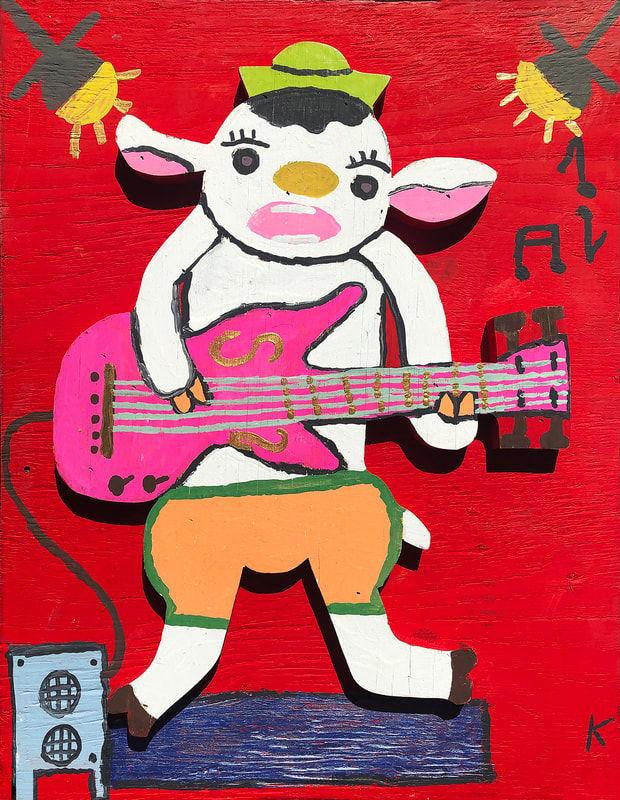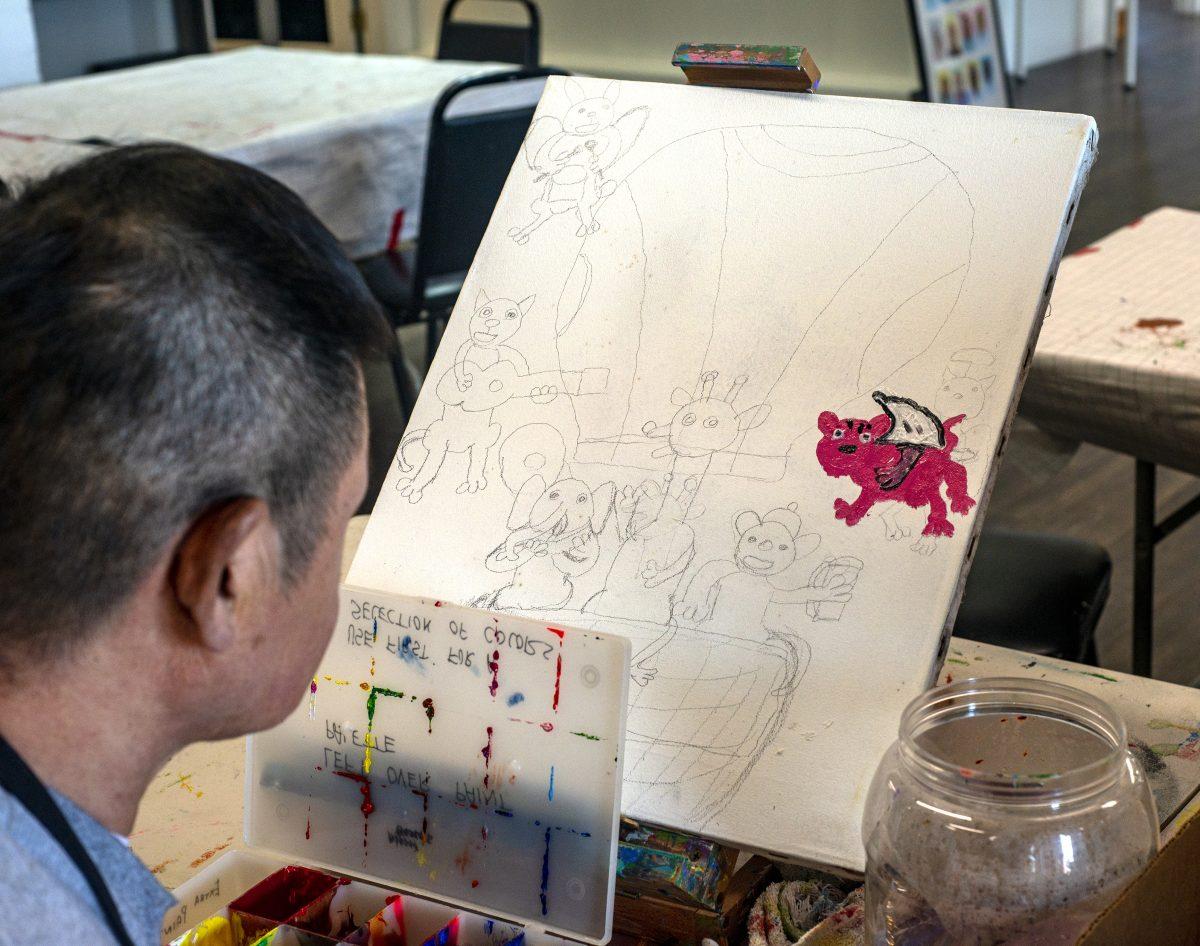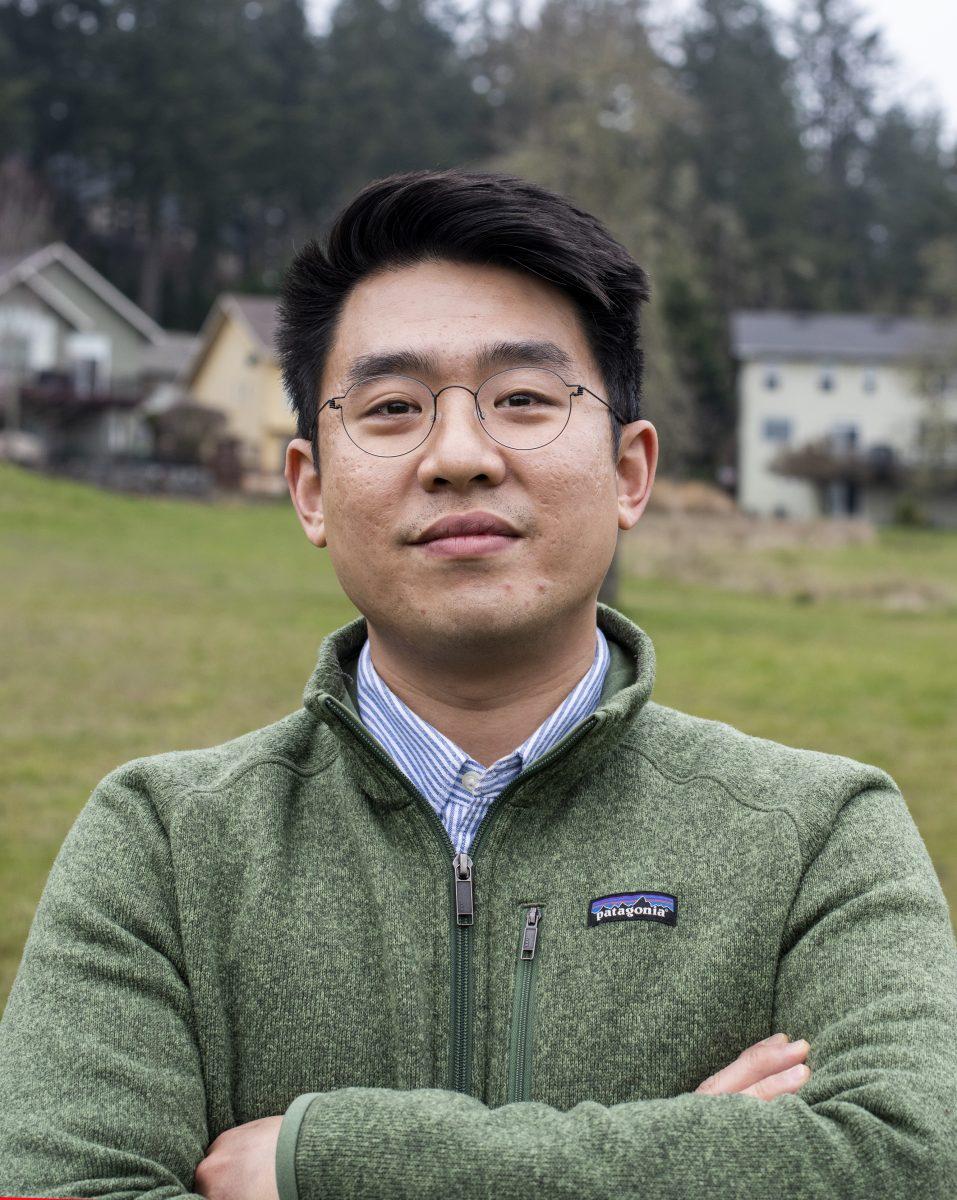Kwang Lee puts his pencil to the canvas and sketches out his ideas for a painting. He begins to sketch a hot air balloon, and in it he traces cats, giraffes and different types of animals playing musical instruments. On the right side of the painting, he draws cats that are dressed up as angels.
Kwang Lee’s sister Tani Lee says that realism doesn’t make sense to him. He does not think about proportion, and he will draw an elephant and a cat the same size. Yet, this is part of what makes Kwang Lee’s paintings so magical. Kwang’s paintings transport spectators into a whimsical world of colorful animals playing instruments. He can spend anywhere from six to eight hours painting.
Eight years ago, Kwang’s art career started when his older sister Tani took him to her watercolor class. She asked him if he wanted to try painting, and from that day, he has always been a painter.
“When I paint, I am in heaven,” Kwang says.
In order to improve his painting skills, Tani enrolled him in classes with the Oregon Supported Living Program’s Arts and Culture Program. Kwang has attended open studio classes every Friday for about three years.
The OSLP Arts and Culture program allows people of all abilities to take art classes. This includes helping adults with developmental disabilities become better at art. Kwang, an adult with autism, finds a lot of comfort in the community he has at the Lincoln Gallery. The staff and students at the Lincoln Gallery accept and appreciate Kwang Lee for his art and who he is as a person.
But before finding a place at the Lincoln Gallery, Kwang struggled to be accepted.
Sixty years ago, he was born in Seoul, South Korea, into a family of classically trained musicians. His father was the army conductor, and his mother enjoyed singing. He is the youngest of five siblings, with two older sisters and two brothers. As Kwang got older, his family soon realized that he was different. Especially as he reached primary school, Tani says kids were very cruel to Kwang.
“As you get older, you go to school, and kids would be very cruel,” Tani says.
Kwang’s siblings always looked out for their younger brother. Their mother always made sure they packed his backpack and walked him to school every day.
This changed when Kwang’s mother died from heart failure when he was 12 years old.
His father remarried shortly after to a woman that Tani describes as “the evil stepmother from Cinderella.” Kwang’s new stepmother convinced their father to move to the countryside. His life completely changed.
The stepmother would yell at their grandmother, and Tani says she could not take it anymore. She was trying to survive high school and the siblings did not spend as much time together.
“He felt lonely. He’s like, ‘what is going on here? Somebody. ‘This lady came in and we were all forced to call her mother, which I resisted. I didn’t call her mother,” Tani says. “He literally just does not even know what’s going on. So for that period, to me, it’s like there was no one because I had to survive myself.”
At this point, Kwang was unable to learn in a traditional school environment, so he ended up leaving school after junior high, Tani says.
Back in the gallery, Kwang sketches with extreme concentration. Kwang often draws chickens and cats. But he primarily draws dairy cows.
After Kwang left school, his stepmother wanted him out of the house, so he picked up a job, Tani says. He worked on a dairy farm for more than a decade. He would wake up every day at 4:30 a.m. and milk 50 cows, one by one. Tani says he worked about 30 different jobs while living in Korea.
There were other jobs Kwang had but did not enjoy. Before moving to Eugene, Oregon, Kwang worked in South Korea at a shoe factory. He would glue the shoes using a spray and inhale toxic chemicals. Tani says that the job was always forced upon Kwang because he did not understand the consequences.
Those were not the only things the factory workers did to make Kwang’s life difficult. Living in Kum Chong, his neighbors always knew when the factory workers were going to get paid in cash.
“So whenever he got paid, he literally either got robbed or forced to spend his money to buy everybody’s lunch, something like that,” Tani says.
At one point, the cops told Kwang to give them his money. When he refused, the cops punched out four of his front teeth. Tani says that Kwang did not reveal this to her until he moved to the United States.
He completes his sketch. Kwang sits with his paint palette and discusses with his sister what colors he should use. He then picks up the paint palette and applies a royal blue color to the hot air balloon. Tani sits next to him and occasionally helps him to decide where he should spread his extra blue paint.
Tani has been taking care of Kwang since he moved to the United States.
Ten years ago, Tani and her older sister were concerned about Kwang’s well-being. He was working a dangerous job at the shoe factory and sleeping on the floor of a Chinese restaurant. Tani and her sister had discussed the possibility of bringing him to the United States so they could look after him.
Around this time, Tani recalls receiving a call from her father, who was visiting at the time. He told her that Kwang was in Eugene. Kwang’s older sister had paid for Kwang to come to America, though she had not consulted Tani about this plan or considered the commitment that was required to watch over Kwang. She had simply paid for his ticket.
Tani then chose to take care of her brother. At first, she was upset that she had been handed this responsibility without warning. It completely changed her life. She has since learned to accept this new reality and continues to watch over her brother.
Back at the canvas, Kwang begins to paint his animals. He first outlines the giraffe in black ink and then colors it in. Joe Peila, the resident artist at the Lincoln Gallery, comes over to the table and directs Kwang to first color and then outline once the paint is dry. Peila repeats the instructions about three times before Kwang follows his suggestion.
The Lincoln Gallery does not tell artists how to paint, but rather helps them expand on their skills. It became a space where Kwang could spend time by himself. Kwang speaks Korean but can only speak English at a two-year-old level, according to Tani. This makes communicating with others in English difficult for him.
Although he cannot communicate much with the staff, Tani says Kwang feels safe there. As he has expanded on his painting, he has received lots of recognition for his art from the Eugene community. In fall of 2019, he had a show at the Eugene airport, organized by Peila, with about 30 paintings. Almost all of them were sold.
“When the kicker makes the point in football — that’s what it feels like to sell a painting,” Tani says.
Kwang says that when people buy his paintings, it gives him purpose. After spending a lot of his life being misunderstood, art has given him the chance to be celebrated for who he is as a person.
“At sixty, Kwang is the happiest man in the world,” Tani says. “Give him a Costco-size pizza and some paint and he could not ask for more.”
Kwang Lee begins painting a new art piece. Lee sketches his art before beginning to paint and adds in color after he has laid the foundation of his work. Photo by Jeremy Williams









![[Photo Courtesy of the Lara Family]
Ruben embraces his beloved childhood goat, Katrina.](https://ethos.dailyemerald.com/wp-content/uploads/2025/05/katrina-1-1060x1200.jpg)


